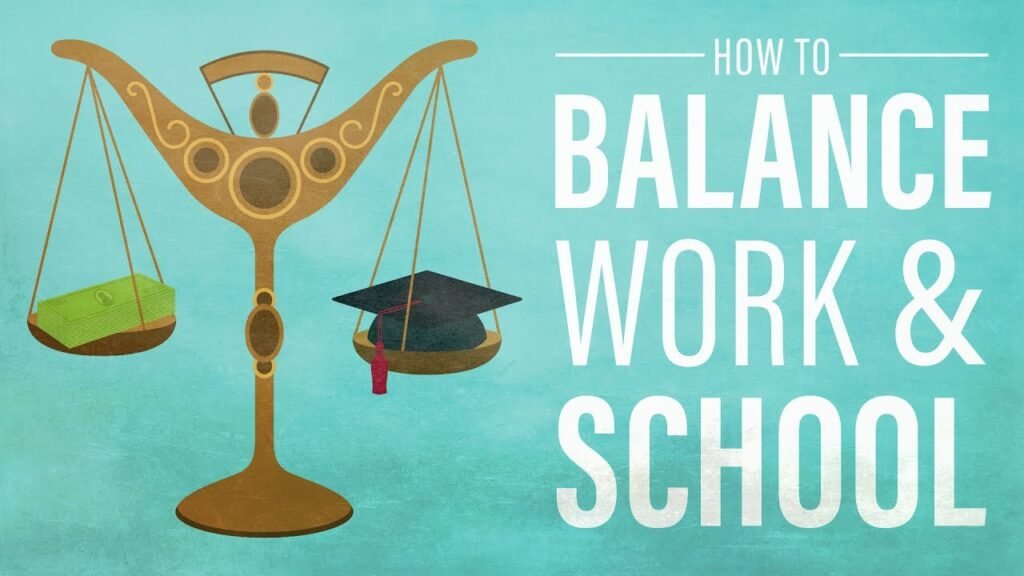Juggling textbooks and a paycheck? Figuring out how to balance college and work can feel overwhelming, but it’s absolutely achievable. It’s about strategy, not superhuman powers. This guide provides a clear roadmap to help you thrive in both arenas.
At a glance:
- Master time management through prioritization and scheduling.
- Explore all financial aid options to minimize financial stress.
- Build a strong support system for emotional and practical help.
- Set firm boundaries to protect your well-being and prevent burnout.
- Remember, adapting is key – be flexible and adjust your strategies as needed.
The Balancing Act: Why It Matters & What’s at Stake
Many students work while attending college. Whether it’s to cover tuition, living expenses, or simply gain experience, the reasons are varied. Successfully Balancing Work and College Life requires understanding the potential challenges and proactively putting solutions in place. It’s important to acknowledge that adding work to your academic life introduces complexity, but with the right toolkit, you can ace both.
On the flip side, doing it wrong can lead to burnout, decreased academic performance, and ultimately, hinder your long-term goals. This guide is designed to help you avoid those pitfalls.
Time: Your Most Valuable Asset
Time management isn’t just about fitting everything in; it’s about making conscious choices about how you spend your time. Bad time management is a huge deterrent to success in college, especially when working part-time or full-time.
Prioritize Ruthlessly
The Eisenhower Matrix, also known as the Urgent-Important Matrix, is your new best friend. Divide your tasks into four categories:
- Urgent & Important: These are crises, deadlines, and pressing problems. Do these immediately.
- Important, But Not Urgent: These are your studies, long-term projects, relationship building, and strategic planning. Schedule time for these.
- Urgent, But Not Important: These are interruptions, some meetings, and other people’s priorities. Delegate these if possible, or minimize them.
- Neither Urgent Nor Important: These are time-wasting activities. Eliminate them entirely.
Take an hour every Sunday evening to map out your week using this matrix. Stick to it as much as possible.
Digital Tools: Your Scheduling Allies
Embrace technology to Manage School and Work. Here are a few effective tools:
- Google Calendar/Notion/Outlook Calendar: Schedule everything – classes, work shifts, study sessions, appointments, even relaxation time. Color-code them for easy visualization.
- Toggl Track/ Clockify: Use a time-tracking app to monitor how you actually spend your time. This helps identify time-wasting activities.
Set Realistic Goals & Break Them Down
Don’t try to conquer the world in a day. Break down large tasks, like studying for an exam, into smaller, manageable chunks. For example, instead of “Study for History Exam,” try “Review Chapter 1 Notes for 30 minutes.” This makes the task less daunting and more achievable.
Build Your Weekly Schedule: A Practical Example
Let’s say you have classes Monday-Wednesday from 9 AM to 12 PM, work Tuesday and Thursday from 2 PM to 8 PM, and want to dedicate weekends to studying and personal time. A possible schedule might look like this:
- Monday: 9 AM – 12 PM (Classes), 1 PM – 3 PM (Study), 3 PM – 5 PM (Gym), 7 PM – 9 PM (Relax)
- Tuesday: 9 AM – 12 PM (Classes), 2 PM – 8 PM (Work), 8:30 PM – 9:30 PM (Dinner & Relax)
- Wednesday: 9 AM – 12 PM (Classes), 1 PM – 3 PM (Study), 3 PM – 5 PM (Errands), 7 PM – 9 PM (Social)
- Thursday: 2 PM – 8 PM (Work), 8:30 PM – 9:30 PM (Dinner & Relax)
- Friday: Free Day/Catch-up
- Saturday: 10 AM – 1 PM (Study), 2 PM – 5 PM (Social/Hobbies)
- Sunday: 1 PM – 4 PM (Study), 4 PM – 6 PM (Meal Prep), 7 PM (Plan the week)
The Power of the Pomodoro Technique
This technique involves working in focused 25-minute intervals, separated by short breaks (5 minutes). After four “pomodoros,” take a longer break (20-30 minutes). This can significantly improve concentration and prevent mental fatigue.
Funding Your Future: Maximizing Financial Aid
Financial stress can severely impact your ability to balance school and work. Exploring all available financial aid options is crucial.
Understanding Your Options
- Scholarships: These are gift aid that doesn’t need to be repaid. Search for scholarships based on academics, interests, background, and even randomly awarded ones.
- Grants: Similar to scholarships, grants are typically based on financial need and don’t require repayment. The Pell Grant is a common federal grant.
- Work-Study Programs: These programs provide part-time jobs for students with financial need, often on campus.
- Student Loans: These need to be repaid with interest. Federal student loans are generally preferable to private loans due to their lower interest rates and flexible repayment options.
The FAFSA: Your Gateway to Federal Aid
The Free Application for Federal Student Aid (FAFSA) is essential for accessing federal loans, grants, and work-study programs. Fill it out early, as funding is often limited.
Scholarship Search Strategies
Use platforms like Fastweb, Scholarships.com, and your college’s financial aid website to search for scholarships that align with your profile. Don’t underestimate the value of local scholarships offered by community organizations.
Tuition Reimbursement: A Hidden Gem
Check with your employer about tuition reimbursement programs. Many companies offer financial assistance for employees pursuing relevant degrees or certifications. University-corporate partnerships intended to make obtaining education easier and affordable are more common than you might expect.
Building Your Support System: You’re Not Alone
Having a strong support network can make all the difference in helping you Ace School & Life. Don’t be afraid to ask for help.
Cultivate Your Network
Your support system can include:
- Family and Friends: Lean on them for emotional support and practical assistance.
- Mentors: Seek guidance from experienced professionals or faculty members.
- Professors: Build relationships with your professors during office hours; they want to help you succeed. Seek help from your academic advisor, as students who meet with their academic advisors are more likely to persist in their studies.
- Supervisors: Communicate your academic commitments to your boss and explore possibilities for flexible scheduling.
- Peers: Connect with other students who are also balancing school and work; you can share experiences and offer mutual support.
Communicate Openly
Share your schedule and goals with your loved ones and employer. This helps them understand your commitments and potentially offer flexibility or assistance.
Embrace Mentorship
Seek out mentors who can provide guidance, advice, and insights based on their own experiences. Your college or university may offer mentorship programs.
Protecting Your Well-being: Avoiding Burnout
Balancing school and work can be demanding, so prioritizing your well-being is essential to avoid burnout.
Recognizing Burnout Symptoms
Burnout manifests as:
- Feelings of self-doubt and inadequacy
- Detachment and cynicism
- Loss of motivation and interest
- A negative or hopeless worldview
Setting Boundaries: Your Shield Against Overload
Clearly communicate your academic commitments to your employer. Negotiate flexible hours if possible. Create dedicated study zones free from distractions. Learn to say “no” to commitments that will overwhelm you.
Prioritizing Health: The Foundation of Success
- Sleep: Aim for 7-8 hours of quality sleep per night.
- Exercise: Regular physical activity reduces stress and improves focus. Even a short walk can make a difference.
- Relaxation Techniques: Practice meditation, yoga, or deep breathing exercises to manage stress.
Create a Shutdown Ritual
Develop a consistent routine to signal the end of your workday or study session. This could involve turning off your computer, tidying your workspace, or engaging in a relaxing activity. This helps you mentally disconnect and transition to personal time.
Addressing Common Concerns & Misconceptions
Q: Is it really possible to work full-time and attend college?
A: It is 100% possible to attend school while working full-time, but it requires exceptional time management, discipline, and a supportive employer. Online courses and flexible scheduling can make it more manageable.
Q: What if I fall behind?
A: Don’t panic. Contact your professors immediately to discuss your situation and explore options for catching up. Utilize tutoring services and connect with classmates for support. Being adaptable and flexible will allow you to overcome challenges more easily when you encounter them.
Q: I feel guilty taking time for myself. What should I do?
A: Recognize that self-care is not selfish; it’s essential for your well-being and long-term success. Schedule regular breaks and activities that you enjoy, and don’t feel guilty about prioritizing your needs.
Moving Forward: Your Action Plan
- Assess your current situation: Evaluate your time commitments, financial resources, and support network.
- Develop a realistic schedule: Use the strategies outlined in this guide to create a weekly schedule that balances your academic, work, and personal responsibilities.
- Explore financial aid options: Complete the FAFSA and search for scholarships.
- Build your support system: Connect with family, friends, mentors, and peers.
- Prioritize your well-being: Protect your time and health so you don’t burn out.
With the right support network and a great degree or certificate program, you’ll be set up for success. Remember, how to separate work and is important to balance your life successfully. Adjusting to a new way of prioritizing your time can feel like a big change, but the effort could very well pay off. Balancing college and work is a challenge, but with the right strategies and support, you can achieve your academic and professional goals.
- Mindfulness Exercises For Anxiety PDF To Reduce Stress - February 26, 2026
- Mindfulness Activities for Adults PDF for Stress Relief - February 25, 2026
- Mindfulness Techniques PDF Offers Free Exercises for Calm and Focus - February 24, 2026














